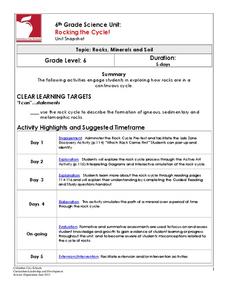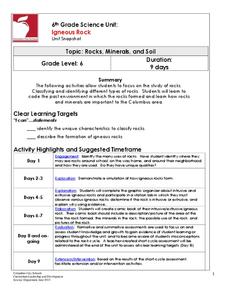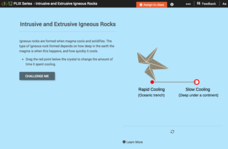NOAA
Plate Tectonics Interactive
Here is a plate tectonics interactive that will really move your class! The first of a 13-part series introduces young geologists to the fundamental concepts and vocabulary they need to understand the interactions between crustal plates....
Columbus City Schools
Rocking the Cycle!
Time to rock out! Discover the "life" cycle of the average rock using an illustrative stations lab and stimulating pairs game. Roll the dice to determine your fate: will it be melting in magma or chilling out to form igneous rock? The...
Columbus City Schools
Igneous Rock
These rocks are HOT! Well, they used to be, anyway. Take young geologists on a two-week journey through the life and times of the average igneous rock. Lab groups work together to hypothesize about intrusive and extrusive igneous rock...
Science Matters
Volcano Models
More than 80 percent of the earth's surface originated from volcanoes. The 16th lesson in a 20-part series introduces the shape and development of volcanoes. It begins with a demonstration using a balloon and flour to illustrate the...
National Geographic
Types of Volcanic Eruptions
Blow the roof off your classroom with this multimedia science lesson on volcanic eruptions. A short online video teaches young geologists about shield and composite volcanoes and explores the examples of Kilauea and Mt. Vesuvius, before...
American Museum of Natural History
Volcanoes Magma Rising
Get ready for an explosive lesson! Learners read and interact with an online lesson describing the characteristics of volcanoes. They study specific historical volcanoes as well as the science of volcanic eruptions using animations and...
NOAA
Subduction Zones
Sink into an interactive learning experience about subduction zones! Junior oceanographers examine the earth-shaking and earth-making effects of subduction in the fourth installment in a 13-part series. Hands-on activities include...
NOAA
Mid-Ocean Ridges Interactive
Your class will be on top of their game when it comes to mid-ocean ridges! The second installment in a 13-part series focuses on the 65,000-km underwater ridge system that spans our globe. Junior oceanographers practice placing the...
CK-12 Foundation
Intrusive and Extrusive Igneous Rocks
Check out a resource that's erupting with engaging material! Earth science scholars discover how igneous rocks form in a well-rounded interactive. They manipulate the cooling time of lava to watch crystals form, learn visual...
CK-12 Foundation
Mineral Formation: Evaporating Lake
Get crazy for crystals! Junior geologists learn the secrets of crystal formation through lecture, reading, and examples. Other topics include common ionic compounds found in fresh and salt water, the effects of location on forming...
NOAA
Where There's Smoke, There's ...
A remotely operated vehicle approaching a volcano was engulfed by molten sulfur where the plumes of fluids contained the highest concentrations of aluminum ever recorded. This isn't science fiction or an April fools joke, though it did...
NOAA
Wooly Magma
Model the earth's core with a neat activity that uses science as an inquiry and step-by-step procedures. The activity acquires a lot of assistance from the teacher or volunteer helpers.
Science Matters
Earthquakes and Volcanoes Post Assessment
The final lesson in the 20-part series is a post assessment covering earthquakes and volcanoes. Twenty-three questions incorporate each of the previous lessons through multiple choice, justified multiple choice, expanded multiple choice,...
Science Matters
Earthquakes and Volcanoes Pre-Assessment
See how much your class knows about earthquakes and volcanic activity and how these events shape geologic features. The first lesson in the series of 20 is a pre-test to find out what pupils already know. It includes 10 vocabulary words...
Worksheet Web
Learning about Volcanoes
There's something about the classic volcano demonstration that can grab any learners' attention. Scholars begin with a reading and grand conversation about volcanoes, construct an erupting volcano using vinegar and baking soda, then show...
Mr. E. Science
Plate Tectonics
Get a detailed look at plate tectonics with a 14-slide presentation that highlights the Earth's layers, continental drift, seafloor spreading, the theory of plate tectonics, and boundary types. Each slide provides thorough explanations,...
Mr. E. Science
Volcanoes
What is the difference between a shield volcano and a cinder cone volcano? How does the flow of lava influence the type of rock that's formed? A presentation on different aspects of volcanoes answers these questions for middle school...
It's About Time
Volcanic Landforms
Did you know the word volcano comes from the name of the Roman god of fire, Vulcan? During this activity, scholars make a topographic map, interpret topographic maps, and infer how lava will flow based on their analysis.
Curated OER
Volcanoes: First Grade Lesson Plans and Activities
Introduce young geologists to types of volcanoes during the pre-lab. First graders explore how different liquids flow with an experiment on viscosity to simulate how different types of lava flow. Next, they learn about the parts of a...
Curated OER
Volcanoes: Second Grade Lesson Plans and Activities
Young geologists explore volcanoes with a series of engaging geology activities. First, they learn the difference between magma and lava before coloring and labeling the parts of a volcano. During the lab, individuals watch a...
Curated OER
Hazards: Third Grade Lesson Plans and Activities
Learners discover hazards related to volcanoes and predict the effects these hazards have on people and land. As blossoming geologists explore various volcanic eruptions, including the hazards associated with them, they create their own...
Curated OER
Volcanoes: Third Grade Lessons Plans and Activities
Discover how rocks are formed from volcanoes during a geology pre-lab activity. Third graders describe the volcanic rock samples and creating a model of Mt. Lassen, located in California. The lesson culminates in a discussion about how...
Curated OER
Volcanoes: Sixth Grade Lesson Plans and Activities
Bring a set of pre-lab, lab, and post-lab lesson plans on volcanoes to your earth science unit. Sixth graders explore the three types of volcanoes found on Earth, plot the specific locations of these volcanoes on a map, and investigate...
Brooklyn Children’s Museum
Volcanoes!
Give young geologists an up close and personal look at volcanoes with a series of hands-on earth science lessons. Whether they are investigating the properties of igneous rocks, building their own volcanoes, or making fudge to model the...

























